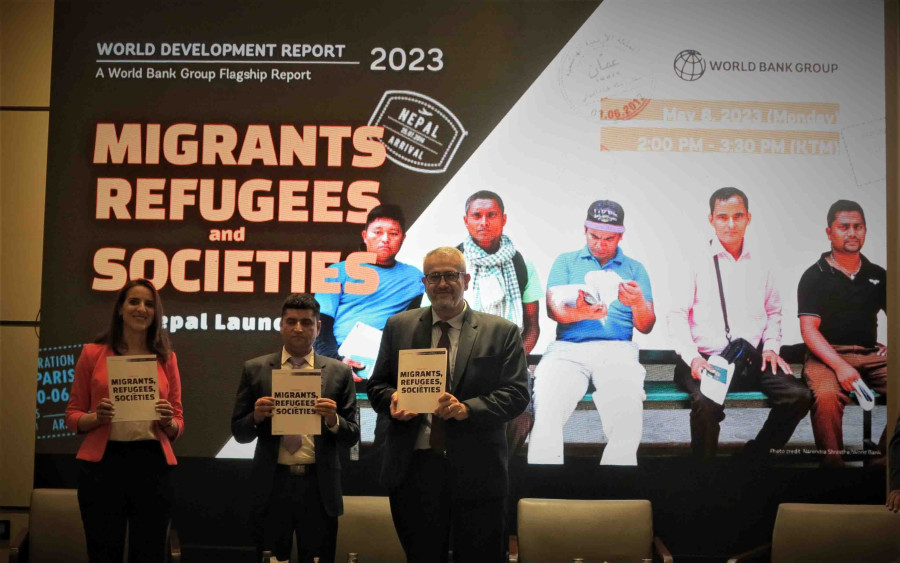Money
Extreme heat will decrease jobs, income productivity, report says
The climate change issue would be serious for countries like Nepal whose economy is dependent on workers’ remittances.
Post Report
In many countries, climate change is expected to reduce people’s ability to work outdoors, which could have major economic and social implications, according to a World Bank report.
The climate change issue would be serious for countries like Nepal whose economy is dependent on workers’ remittances.
An increasing number of Nepali workers in the Persian Gulf and Malaysia are dying of heat, and experts have warned that their numbers may grow since the global average temperature is set to rise further in the coming decades.
The Development Report 2023 on Migrants, Refugees and Societies released on Monday, said that the economic opportunities are dwindling in the affected regions, amplifying vulnerabilities and fueling pressures for migration.
Climate change is compounding the economic drivers of migration.
About 40 percent of the world’s population—3.5 billion people—live in places highly exposed to the impacts of climate change like water shortages, drought, heat stresses, sea level rise, and extreme events such as floods and tropical cyclones, the report added.
Rising global temperatures have contributed to more frequent and severe extreme weather events around the world, including heat waves, drought, heavy precipitation, floods and storms, said the report.
It added: “Such disasters can reverse decades of development progress. Climate change is also manifested in slow-onset impacts, such as shifts in temperature and precipitation patterns, sea level rise, and ocean warming. These impacts have documented development effects on a wide range of outcomes such as health, income, food security, water supply, and overall human security.”
Climate impacts affect the very habitability and income productivity of some regions.
“As the world struggles to cope with global economic imbalances, diverging demographic trends and climate change, migration will become necessary in the decades to come for countries at all levels of income,” said Faris Hadid-Zervos, country director of World Bank in Maldives, Nepal and Sri Lanka.
Climate change is affecting these issues and adding to economic drivers of the migration, he added.
Hadid-Zervos said migration is a developmental challenge and can be a force of prosperity, so it could be both sides of the coin.”About 184 million people which is 2.3 percent of the world’s population live outside of their country of nationality and almost half of them are lower-middle income countries.The demographic transitions with this many high upper-income and upper-middle-income countries have sparked intense global competition for workers and talents.”
“The issue of demographic transition is affecting Nepal like elsewhere and there is a need for more workers,” Hadis-Zervos added.
In Nepal, many youths are leaving the country to identify and to see better opportunities outside, which has an impact on their families and positive impact on the country’s economy where roughly 23 percent to 26 percent of the gross domestic product comes from remittances.
“It’s not whether migration is good or bad, but rather how we can better manage migration so that it serves as a force for development and prosperity for all countries,” Hadid-Zervos said. “This is particularly important for the lower-middle-income countries where nearly half of all migrants live.”
He added: “In Nepal, like other lower-middle income countries, remittances received by the families is a lifeline and also for the economy which contributes to significant poverty reduction.”
“Moving forward, empowering and equipping youth with the skills that will be needed in the global labour market will be crucial for both origin and destination countries to maximise the benefits of migration,” said Joyce Antone Ibrahim, task team leader for the World Development Report, World Bank.
Shreekrishna Nepal, joint secretary of the Ministry of Finance, said it is important to address domestic migration challenges, particularly rural-to-urban that Nepal is currently facing.
“The government has prioritised, through its policies, to retain its workforce within the country by creating job opportunities particularly for the youth,” he said.
Remittance inflows crossed a Rs1 trillion mark in the last fiscal year ended mid-July, according to Nepal's central bank. In the previous fiscal year 2020-21, Nepal had received Rs961.05 billion in inward remittances.




 9.12°C Kathmandu
9.12°C Kathmandu













